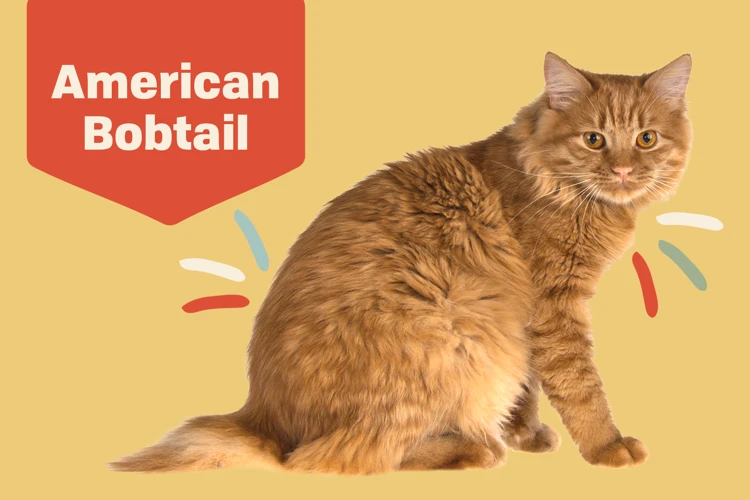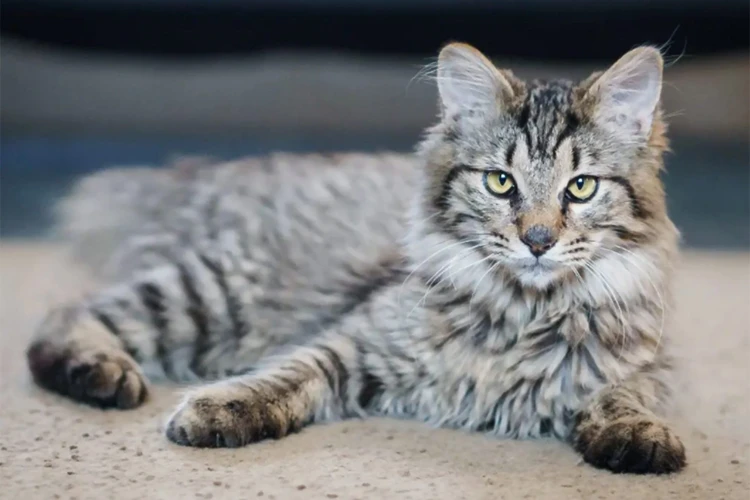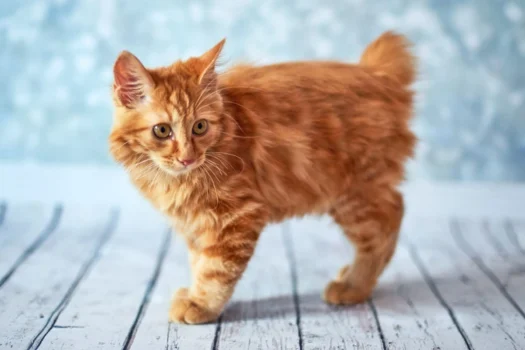As a cat owner, you surely understand how rewarding it is to have a feline companion who is friendly, sociable, and affectionate. American Bobtail cats, in particular, are known for their playful personalities and sweet dispositions. However, not all American Bobtails are naturally social creatures. Some may be hesitant or fearful around new people and other animals, which can be a concern for pet owners who want to help their furry friends live happy, well-adjusted lives. Fortunately, with some tips and training techniques, you can enhance your American Bobtail’s sociable nature and build a stronger bond with your feline companion. Let’s dive into the details!
Understanding Your American Bobtail’s Personality

Understanding the personality of your American Bobtail is essential for enhancing their sociable nature. These captivating felines are known for their playful nature, affectionate temperament, and friendly personality. As the ideal pet for kids and adults, American Bobtails make wonderful companions. To ensure their sociability and friendly nature, it is important to understand the inherent characteristics of this unique feline breed. Let’s delve into the fascinating world of the American Bobtail’s personality and see what makes them so special. For more information on the breed, check out our article on the American Bobtail feline breed.
Identify the Signs of Socialization
Identifying the signs of socialization is the first step in training your American Bobtail to enhance their sociable nature. Socializing is about developing a sense of comfort and trust around others, which can be easily seen through their behavior. Here are some signs to look out for:
- Friendly demeanor: One of the easiest signs to identify is the friendly personality of American Bobtails. If your cat enjoys being in the company of people and other animals, and seem relaxed while doing so, they are already showing signs of being socialized. For more information on friendly American Bobtails, check out our friendly personality article.
- Playfulness: American Bobtail cats are known for their playfulness, and this is also seen as a sign of socializing. If they are open to playing with you, other animals or toys, it shows they are comfortable and at ease in their environment. Read more about American Bobtail’s playfulness in this article.
- Affectionate behavior: When an American Bobtail cat displays affectionate behavior towards its owner, such as cuddling, being vocal, and rubbing against their legs, it is a sure sign of socialization. For more information on affectionate American Bobtails, click on this link.
On the other hand, if you notice your American Bobtail cat cowering, hiding or being aggressive towards people or other animals, it is a sign that they have not been socialized well. This can be due to various reasons, such as lack of interaction during the kittenhood, previous bad experiences, or genetics. To learn more about the temperament of American Bobtail cat and its effect on socialization, visit this article.
It is important to recognize these signs of socialization so that you can be mindful of your cat’s behavior and find effective ways to train them. Remember that socializing takes time, patience, and consistency.
Recognize the Causes of Unsociable Behavior
As a cat owner, recognizing the causes of unsociable behavior in your American Bobtail is crucial. Some common reasons why cats can exhibit unsociable behavior include:
- Fear or Stress: Cats can become fearful or stressed due to changes in their environment, loud noises, or other pets in the house. This can lead to hiding or aggressive behavior if they feel threatened or uncomfortable.
- Trauma or past experiences: Some American Bobtails may have had traumatic experiences with humans or other animals in the past which can lead to fear or mistrust.
- Illness or Pain: Cats can become unsociable if they are sick or in pain, and they may lash out at humans or other pets. It’s important to take your American Bobtail to a vet for regular check-ups.
- Lack of socialization: If your American Bobtail was not socialized properly as a kitten, they may have a harder time being around other cats, pets, or humans.
Being aware of these causes of unsociable behavior can help you understand and address the root of the problem. If you notice any signs of unsociable behavior in your American Bobtail, it’s important to take action to correct the behavior before it becomes a habit. Remember, a well-socialized American Bobtail can make an ideal pet for kids and adults.
Plan Ahead for Training
To effectively train your American Bobtail cat and enhance their sociable nature, you need to plan ahead. First, choose a time when you can dedicate yourself to this activity without distractions. It could be early morning or late evening when there is minimal disturbance.
Make a list of training goals and objectives that you hope to achieve during each session. Break them down into smaller, achievable steps that are easy for your cat to understand and learn. Use an html list to arrange these objectives to ensure that you have a clear roadmap to follow during the training.
It is essential to prepare the training area for your cat to make it feel safe and comfortable. Remove all potential distractions or hazards, such as loud noises or sharp objects. Ensure that the space is well lit and provides easy access to your cat’s preferred toys and treats.
If done correctly, training can be a fun and engaging activity for both you and your American Bobtail cat. However, if you’re struggling to come up with ideas or having trouble getting your cat to cooperate, consider seeking professional guidance from a certified animal trainer or behaviorist. They have advanced knowledge and training techniques that can improve the effectiveness of your training.
Having a sociable cat can also make it an ideal pet for kids. Learn more about this topic by reading our article on ideal pets for American Bobtail cats and kids.
Be Patient and Consistent
One of the most important things to remember when training American Bobtail cats to enhance their sociable nature is to be patient and consistent. This means that you should not expect your cat to change overnight and that you should maintain a consistent approach throughout the training process.
Patience: Patience is key when it comes to training American Bobtail cats. These cats are unique and have their own personalities, so it may take some time for them to learn new behaviors. It’s important to give your cat time to adjust and to not get frustrated if progress is slow.
Consistency: Consistency is also important when training your American Bobtail cat. This means that you should have a set routine that you follow and that you reinforce the same behaviors consistently. For example, if you are trying to teach your cat to socialize with other cats, make sure that you consistently introduce them to other cats and reward them when they exhibit sociable behavior.
To help maintain consistency, you may find it useful to create a training schedule. This schedule can outline the specific goals that you want to achieve and when you expect to achieve them. It’s important to remember that training is an ongoing process and that you may need to adjust your schedule based on your cat’s progress.
Another important aspect of consistency is to use the same training techniques and commands. This helps your cat to understand what you are asking of them and promotes faster learning. Being consistent also means that you should not give up on training if you experience setbacks or if progress is slow. Instead, continue to work with your cat and focus on building a positive and trusting relationship.
Being patient and consistent is key when training American Bobtail cats to enhance their sociable nature. By following a set routine, using the same techniques, and not getting discouraged by slow progress, you can help your cat become more sociable and develop a stronger bond with you.
| Importance | Patience | Consistency |
|---|---|---|
| Explanation | Patient approach during training | Follow a set routine and reinforce same behaviors |
| Example | Allowing time for cat to adjust to new behaviors | Consistently introducing cat to other cats and rewarding sociable behavior |
| Schedule | Training schedule to outline specific goals | Use the same training techniques and commands |
| Setbacks | Don’t give up on training if setbacks occur | Continue to work with your cat and focus on building a positive relationship |
Building Trust with Your American Bobtail

As a pet parent of an American Bobtail, one of the most significant tasks is building a mutual trust with your furry friend. This bonding process takes time, effort, and patience, but the result is a stronger, more meaningful relationship. Understanding your American Bobtail’s personality and using positive reinforcement are crucial in building trust. Let’s delve into some useful tips and techniques that will aid you in this journey.
Establish a Bond with Your Pet
One of the most important steps in training your American Bobtail to enhance their sociable nature is to establish a strong bond with them. This will not only help them to trust you, but it will also make the training process much easier and enjoyable for both you and your pet.
Here are some ways to establish a bond with your American Bobtail:
- Spending time together: Spend quality time with your pet every day by playing with them, petting them, and talking to them. This will help them feel more comfortable around you and form a strong attachment.
- Physical contact: Physical contact is essential to establish a bond with your American Bobtail. Gently stroke and pet them, cuddle with them, and hold them in your lap if they like it.
- Positive reinforcement: Use positive reinforcement to reward good behavior and show your pet that you love and appreciate them. Offer treats and praise when they follow a command or behave well.
- Eye contact: Eye contact is crucial for building trust and establishing a bond with your American Bobtail. Look into their eyes and speak to them in a calm and reassuring tone of voice.
- Sharing experiences: Share experiences with your pet, such as taking them on walks or playing with them in new environments. This will create positive associations and strengthen your bond.
Remember, establishing a bond with your American Bobtail is a gradual process that requires patience and consistency. It may take some time for your pet to warm up to you, but with the right approach and plenty of love and attention, you can build a strong and lasting bond with them.
Use Positive Reinforcement
When it comes to training your American Bobtail cat, one of the most effective techniques is using positive reinforcement. This means rewarding your cat for good behavior instead of punishing them for bad behavior. Positive reinforcement can be anything your cat enjoys, such as treats or praise.
To use positive reinforcement, start by identifying the behaviors you want to encourage in your cat. For example, if you want your cat to be more sociable, you can reward them for approaching people or other cats. Once you’ve identified the desired behavior, you can start rewarding your cat every time they perform it.
How to Use Positive Reinforcement for Training Your American Bobtail Cat
Here’s an example of how you can use positive reinforcement to train your American Bobtail cat to be more sociable:
| Desired Behavior | Reward |
|—————–|——–|
| Approaching people or other cats | Treats or praise |
Every time your American Bobtail cat approaches a person or another cat, reward them with a treat or praise. This will reinforce the behavior and encourage your cat to be more sociable in the future.
It’s important to be consistent with positive reinforcement. If you only reward your cat occasionally, they may not understand what behavior they should be repeating. Regular rewards, on the other hand, will make the desired behavior more appealing to your cat and they will be more likely to perform it again.
Avoid Aggressive Behavior or Punishment
It’s important to note that positive reinforcement does not involve punishing your cat for bad behavior. Punishment can actually make your cat more anxious and unsociable, as well as cause them to develop other behavior problems.
Instead, focus on rewarding good behavior and ignoring bad behavior. This will help your cat associate good behavior with positive rewards and incentivize them to act in a positive way.
Using positive reinforcement is a key aspect of training your American Bobtail cat to be more sociable. By regularly rewarding good behavior, your cat will become more inclined to behave positively and approach people and other cats. Remember to avoid punishment and maintain consistency in your training efforts.
Avoid Aggressive Behavior or Punishment
When it comes to training your American Bobtail, it’s important to avoid using aggressive behavior or punishment. This is because these actions can cause your cat to become fearful or anxious, which will only make it more difficult to socialize them.
Here are some tips on how to avoid aggressive behavior or punishment:
- Stay calm: If you become angry or frustrated with your cat, take a break and come back to the training session later when you can approach it calmly. Your cat will pick up on your emotions and may become anxious or fearful as a result.
- Use positive reinforcement: Instead of punishing your cat for bad behavior, focus on rewarding them for good behavior. Offer treats, pets, and praise when your cat displays the sociable behavior you’re trying to encourage.
- Avoid physical punishment: Never hit, kick, or physically harm your cat in any way. This type of punishment can cause your cat to become fearful of you and may damage the bond you’re trying to build.
- Don’t shout: Shouting at your cat can be frightening for them and may cause them to associate training with negative experiences.
- Be patient: Remember that socializing your cat takes time and patience. Don’t expect immediate results and be consistent with your training.
By following these tips, you can create a positive training experience for your American Bobtail that will enhance their sociable nature and strengthen your bond with them.
Offer Treats and Praise to Encourage Good Behavior
Positive reinforcement is a crucial technique when training American Bobtail cats to enhance their sociable nature. Offering treats and praise is an effective way to encourage good behavior during training.
To make the most of treats and praise, start by selecting healthy and nutritious treats that your cat adores. This could be anything from small pieces of cooked chicken or fish to store-bought cat treats. Be sure to use small portions, as the goal is to provide a reward, not a meal.
When your American Bobtail performs a desired behavior, immediately offer a treat along with verbal praise in a calm and reassuring voice. This reinforces the behavior by linking it with a positive outcome. The positive experience of receiving a treat with praise will encourage your cat to repeat the behavior in the future.
It’s important to remember that using treats should be a rewarding experience for your cat, not an expectation. Avoid over-reliance on treats, as it can lead to obesity and spoil the desired effect of positive reinforcement. Treat your cat as a whole being, and use treats to boost its sociable behavior.
In addition to treats, praise is another form of positive reinforcement that can be incredibly effective. Throughout training, take the time to bond with and talk to your American Bobtail, offering verbal phrases like “good job” or “well done” when it performs a desired behavior.
Remember to always be patient and consistent with your training techniques, and use treats and praise as a tool to encourage desired behavior. Over time, your American Bobtail will learn to associate socializing with positive experiences, leading to enhanced sociability in various settings.
Training Techniques to Boost Sociability
As you work on enhancing the sociable nature of your American Bobtail, it is important to have an array of training techniques at your disposal. By utilizing different methods, you can expose your pet to new experiences and encourage socialization with other cats and people. In this section, we’ll explore some effective training techniques that can help boost your American Bobtail’s sociability. So roll up your sleeves, get ready to dive in, and let’s explore these techniques together!
Socialize Your American Bobtail with Other Cats and People
It’s important to socialize your American Bobtail with other cats and people to enhance their sociable nature. Here are some effective tips to help you with that:
1. Introduce Your Bobtail to Other Cats: Start by introducing your Bobtail to other cats in a controlled environment. Keep them on a leash or in separate rooms at first, then gradually let them interact more freely. Observe their body language and behavior to ensure they are comfortable with each other. Reward good behavior with treats and positive reinforcement.
2. Expose Your Bobtail to New People: Expose your Bobtail to new people on a regular basis to help them become more sociable. Start with friends and family members, then gradually introduce them to new faces. Always supervise their interactions and offer treats for good behavior.
3. Use Treats to Encourage Positive Socialization: Use treats to encourage positive socialization with other cats and people. Offer your Bobtail treats when they approach other cats or people in a friendly manner. This will help them associate positive rewards with socialization and encourage them to continue this behavior in the future.
4. Provide Plenty of Playtime: Playtime is a great way to help your Bobtail socialize with other cats and people. Encourage them to play with toys and interact with others. This will help them become more comfortable and relaxed around others.
5. Be Patient: Socialization takes time and patience. It’s important to be patient and let your Bobtail take things at their own pace. Don’t force them to interact with other cats or people if they’re not ready. With time and positive reinforcement, they will become more sociable and comfortable around others.
Socializing your American Bobtail with other cats and people is an important part of enhancing their sociable nature. Use the tips above to help your Bobtail become more comfortable and relaxed around others.
Expose Your Pet to New Environments and Experiences
Expose Your Pet to New Environments and Experiences
One effective way to enhance the sociable nature of American Bobtail cats is by exposing them to new environments and experiences. This can greatly benefit their overall behavior, as it encourages them to adapt to new situations and meet new people and animals. Here are some tips for exposing your pet to new experiences:
| Tip | Description |
| Take your cat on a leash | Leash training is an excellent way to take your cat outside and introduce them to new sights, sounds, and smells. Make sure to use a harness designed for cats and start in quieter areas before moving to busier ones. |
| Introduce new toys | Providing new toys will encourage your cat to play and interact, promoting more sociable behavior. Toys that require problem-solving or collaboration, like puzzle feeders, are ideal for American Bobtails. |
| Bring your cat to new environments | Making occasional trips to new environments, like a friend’s house or a local pet store, is a great way to expose your cat to new experiences. This can help them build confidence and reduce their stress when surrounded by new people and animals. |
| Expose your cat to different sounds and smells | Exposing your cat to different sounds and smells can also help in adapting to new environments. Playing different audios like bird sounds or cat sounds can help familiarize them with other animals. Similarly, allowing sniffing different scents like lavender, mint or citrus can help to boost their mood. It’s extremely beneficial to use non-toxic scents, and never expose cat to any harm or potential danger to unfamiliar smells. |
Through these tips and techniques, you can create a positive experience for your American Bobtail and encourage a more sociable and friendly temperament. Remember to always monitor your pet’s reaction to new experiences and adjust accordingly to ensure their safety and happiness.
Play Games that Encourage Socializing
Playing games is one of the best ways to encourage socializing in your American Bobtail cat. By engaging in play, you can help your cat feel more comfortable and confident around people and other pets. Here are some games you can try:
1. Feather wands: Feather wands are an excellent way to stimulate your cat’s natural hunting instinct. These wands mimic the movement of birds, which can entice your American Bobtail to follow and jump. Start by waving the wand above your cat and encourage them to jump and catch the feather. This game helps promote socializing and can build a stronger bond between you and your pet.
2. Hide and seek: This game is perfect for enhancing socialization while keeping your American Bobtail entertained. Start by hiding treats around the house and encouraging your pet to find them. As your cat becomes more confident, you can hide yourself or other people and encourage your cat to find them. This game can help build trust and enhance your cat’s sociability.
3. Puzzle toys: Puzzle toys are excellent for keeping your American Bobtail engaged while promoting socialization. These toys are designed to require problem-solving skills, which can help your cat become more confident and comfortable around people and other pets. Try introducing toys that require manipulation or those that dispense treats. These games can keep your cat entertained for hours and can be an excellent way to enhance sociability.
4. Catnip toys: Catnip toys are known to promote playfulness and socialization in cats. These toys contain catnip, which is a herb that stimulates cats’ senses and can encourage them to play. Try introducing catnip toys and observe how your American Bobtail reacts. This game can be an excellent way to help your cat become more comfortable around people or other pets.
By playing games that promote socialization, you can enhance your American Bobtail’s sociability and build stronger bonds with your pet. Remember to keep games safe, fun, and rewarding. Observe your cat’s behavior and adjust the games as needed. With patience and consistency, you can help your American Bobtail become a more sociable and confident companion.
Use Toys that Promote Interaction and Cooperation
When training your American Bobtail to enhance their social nature, it’s important to make the process as fun and engaging as possible. One effective way to do this is by incorporating toys that promote interaction and cooperation. Here are some types of toys you can use to encourage your cat’s sociability:
- Puzzle Feeders: Puzzle feeders are interactive toys that require your American Bobtail to work for their food. These toys are designed to stimulate your cat’s mind while also providing a challenge, which can help boost their social skills as they learn to problem-solve on their own.
- Interactive Toys: Interactive toys, such as laser pointers or feather wands, require you to play with your cat. These toys promote bonding between you and your pet and can also help your American Bobtail learn to socialize with others.
- Play Tunnels: Play tunnels provide a fun environment for your American Bobtail to explore and play with others, promoting their social skills and encouraging them to be more outgoing.
- Treat Dispensers: Treat dispensers reward your American Bobtail for interacting with the toy. These toys are great for promoting positive reinforcement and can help your cat learn to associate good behavior with a tasty reward.
When selecting toys for your American Bobtail, look for ones that are safe and durable. You should also consider your cat’s personality and preferences when choosing toys. Some cats prefer more active toys, while others prefer quieter, more relaxing options. By incorporating toys that promote interaction and cooperation, you can help your American Bobtail develop their sociability in a fun and engaging way.
Train Your American Bobtail to Respond to Commands
Teaching your American Bobtail cat to respond to commands is crucial to enhance their sociable nature. Here are some tips to help you train your cat to respond to commands:
- Start with basic commands such as “Sit” or “Come.” Use a clicker and reward your cat with treats or petting when they follow the command correctly. Repeat the command until your cat associates the word with the action.
- Use consistent hand gestures or verbal cues when giving commands so your cat can learn to recognize them.
- Gradually increase the difficulty of the commands and reward your cat for every successful attempt. Avoid punishing or scolding your cat if they fail, as this can discourage them from trying again.
- Practice 5-10 minute training sessions every day to keep your cat engaged and focused.
- Make training fun and interactive by incorporating play and toys.
- Use positive reinforcement to motivate your cat to learn new commands. Offer treats or engage in playtime as a reward for their success.
- Practice patience and consistency during the training process as it may take time for your cat to learn new commands.
Remember to use gentle and positive training techniques to foster a trusting relationship with your American Bobtail cat. With patience and consistency, your cat can learn to respond to commands and enhance their sociable nature.
Monitor Behavior and Adjust Training as Needed
As you continue training your American Bobtail, it is important to monitor their behavior and adjust your training techniques as needed. This will ensure that your cat continues to make progress in their sociability and that you are using the most effective training methods for their personality.
Behavior Monitoring
Keep an eye on your cat’s behavior during and after training sessions. Note any changes in their demeanor or any negative reactions to certain techniques. For example, if your cat becomes stressed or aggressive during a particular game, consider modifying the game or using a different approach.
Another important aspect of behavior monitoring is to pay attention to your cat’s body language. Signs of stress, anxiety, or fear may include flattened ears, a puffed-up tail, or dilated pupils. On the other hand, signs of comfort and trust may include relaxed ears and tail, purring, and rubbing against you or other cats.
Adjusting Training Techniques
Based on your observations, be willing to adjust your training techniques as needed. This may mean modifying a game, using a different toy, or changing the timing or duration of training sessions. Remember to use positive reinforcement and avoid punishment or aggression.
Additionally, it is important to be adaptable and patient throughout the training process. Each cat is unique and may require different approaches. What works for one American Bobtail may not work for another. Don’t be afraid to try new techniques or seek out advice from a professional trainer or veterinarian.
| Behavior Monitoring | Adjusting Training Techniques |
|---|---|
| Watch for changes in behavior during training sessions | Be adaptable and patient throughout the process |
| Pay attention to body language for signs of stress or comfort | Try new techniques or seek advice from professionals |
| Note any negative reactions and modify techniques as needed | Use positive reinforcement and avoid punishment or aggression |
By consistently monitoring your cat’s behavior and adjusting training techniques as needed, you can help ensure that your American Bobtail becomes a sociable and well-adjusted companion. Remember to remain patient and adaptable throughout the process, and use positive reinforcement to encourage good behavior.
Conclusion
In conclusion, training your American Bobtail to enhance their sociable nature is not an overnight process. It requires patience, consistency, and dedication to build trust and establish a bond with your feline friend.
Identifying the signs of socialization and recognizing the causes of unsociable behavior are crucial steps towards building a foundation for training. Planning ahead and setting achievable goals can help you stay on track and make progress in training.
Establishing a bond with your pet through positive reinforcement and avoiding aggressive behavior or punishment can help build trust and encourage good behavior. Offering treats and praise can also go a long way in motivating your cat to socialize with other cats and people.
Training techniques such as socializing your American Bobtail with other cats and people, exposing them to new environments and experiences, and playing games that encourage socializing can help boost their sociability. Using toys that promote interaction and training them to respond to commands can also be effective in enhancing their sociable nature.
It’s important to monitor your cat’s behavior and adjust training as needed to ensure progress is being made. Remember, each cat is unique and may require a different approach to training.
In conclusion, with the right mindset and techniques, training your American Bobtail to enhance their sociable nature can be a rewarding and enriching experience for both you and your furry friend.
Frequently Asked Questions
What is the American Bobtail breed known for?
American Bobtail cats are known for their friendly and outgoing personalities, as well as their unique bobbed tails.
At what age should I start training my American Bobtail?
You can start training your American Bobtail as early as 12 weeks old.
Do American Bobtails get along with other cats?
American Bobtails generally get along well with other cats, especially if they are socialized from a young age.
How long does it typically take to train an American Bobtail?
The length of time it takes to train an American Bobtail varies, but with consistent training, you can start to see results within a few weeks.
What kind of treats should I give my American Bobtail during training?
You can give your American Bobtail small, soft treats like bits of cooked chicken or fish to reward good behavior during training.
Can I train my American Bobtail to walk on a leash?
Yes, you can train your American Bobtail to walk on a leash, but it’s important to start with short and supervised walks in safe areas.
What kind of toys should I use to promote sociability?
Toys like feather wands and interactive puzzles can help promote sociability by encouraging play and interaction between cats and their owners.
What should I do if my American Bobtail seems uninterested in socializing?
If your American Bobtail seems uninterested in socializing, you may need to adjust your training techniques or consult with a professional trainer.
Can my American Bobtail become too sociable?
Your American Bobtail can become overly sociable if they are not given enough alone time or if their basic needs are not being met. It’s important to provide a balance of social interaction and independent time.
Can I train my American Bobtail to be a therapy cat?
Yes, American Bobtails can make great therapy cats with the proper training and temperament. It’s important to start with basic training and socialization before pursuing therapy training.







